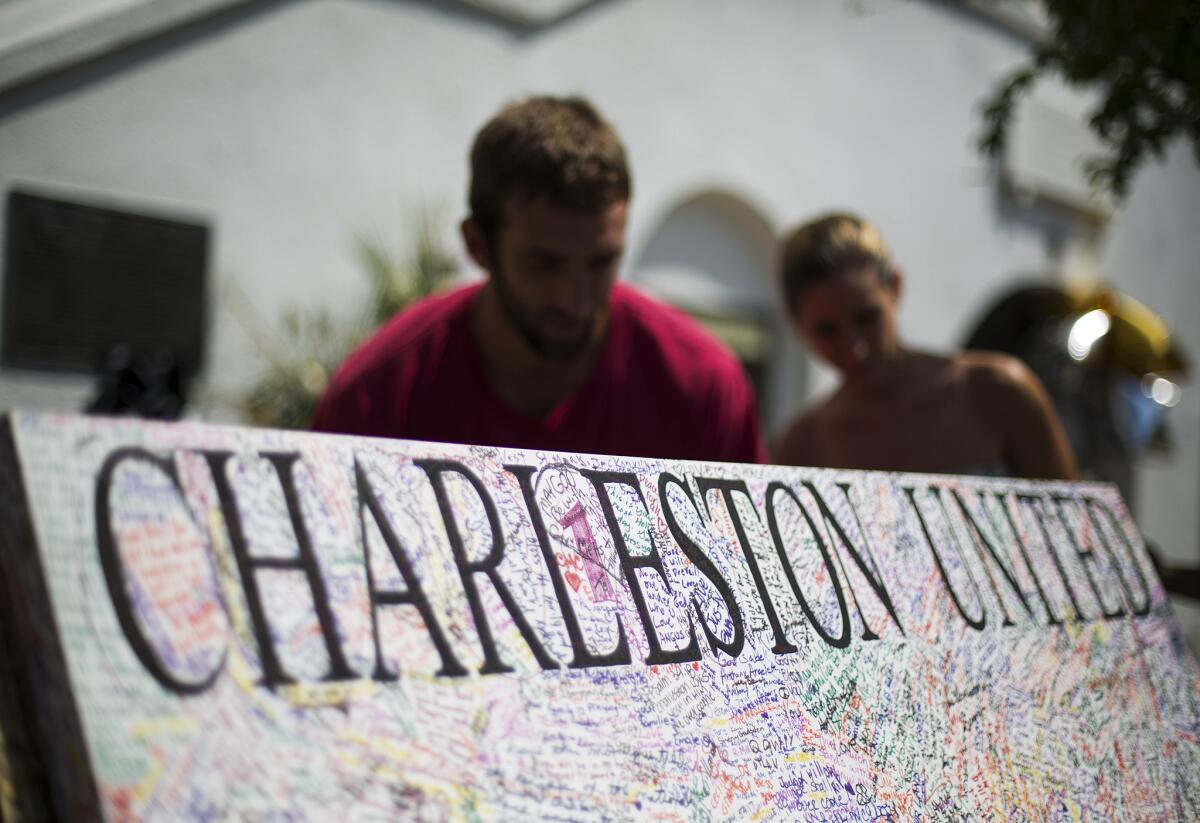Column:: In the South, grace and dignity after Charleston church shootings

A message board stands at a sidewalk memorial as visitors write notes in memory of the shooting victims in front of Emanuel AME Church on June 22 in Charleston, S.C.
- Share via
“Lots of folks expected us to do something strange and break out in a riot. Well, they just don’t know us,” the Rev. Norvel Goff told the packed, multiracial congregation of Emanuel African Methodist Episcopal Church in Charleston, S.C., on Sunday. It was the first service since the horrific slaughter of nine innocent souls by a racist fanatic.
Not being a Christian, I can only marvel at the dignity and courage of the victims’ relatives who forgave the shooter. If I could ever manage such a thing, it would probably take me decades. It took them little more than a day.
Less shocking, but almost as uplifting, was the conduct of the broader Charleston community, which has been unified and dignified, despite the expectations of some in the media — and the accused gunman, who had singled out Charleston because of its success at racial integration.
And this points to Goff being right, not just about Charleston but about the South in general.
There are few subjects that ignite more casual, uninformed bigotry and condescension from elites in this nation than Dixie. “Practically the whole region has rejected nearly everything that’s good about this country and has become just one big nuclear waste site of choleric, and extremely racialized, resentment,” the Daily Beast’s Michael Tomasky wrote last year.
How then to explain the tens of thousands of South Carolinians, white and black, marching in unity across the Ravenel Bridge on Sunday night? Did the city bus in decent Northerners?
The Washington Post’s Sally Jenkins glibly asserts that “the Confederate battle flag is an American swastika, the relic of traitors and totalitarians, symbol of a brutal regime, not a republic.”
If it were left to me, I would take the flag down (for the reasons South Carolina Gov. Nikki Haley laid out Monday). But this kind of cheap moral preening is galling. Is it really too much for people to muster the moral imagination that the issue isn’t nearly as simple as that?
A November poll of South Carolinians found that 61% of blacks wanted it down. That means nearly 4 in 10 blacks felt differently. Are they deluded? Are they the moral equivalent of self-loathing Jews, happy to live under a swastika?
It’s a sure bet that some of the white South Carolinians marching across that bridge and attending services at Emanuel AME Church also support keeping the flag. That doesn’t mean they’re right, but they surely aren’t the American SS of Jenkins’ imagination either.
Blogger Glenn Reynolds noted that when the South was solidly Democratic, we got “Gone With the Wind” nostalgia. Now that it is profoundly less racist, but less useful to Democrats, it’s the enemy of all that is decent and good.
If we’re going to offer ridiculous flag comparisons, a better one would be the Japanese imperial flag. After World War II, the U.S. banned it until 1949. Douglas MacArthur then opted to let a defeated, once-authoritarian society keep a few symbols of its past in order to build a better future.
Can anyone argue that the South hasn’t done likewise? White Northern liberals explain how the South is an irredeemable cesspool of hate, while ignoring the fact that blacks are abandoning the Northern blue states in huge numbers to move to the South.
Demographer Joel Kotkin found that 13 of the 15 best cities in the country for African Americans to live in are now in the South. Over the last decade, millions of African Americans have been reversing the Great Migration of a century ago to live in Dixie. A big part of that story is economic, of course — the “blue state” model has failed generations of minorities — but it’s also cultural. Word has gotten out that while the flags may be around in some places, the Old Confederacy is gone.
Whenever conservatives complain that blacks vote monolithically Democratic, liberals are quick to argue that this is a rational decision given the realities of the black community. Surely, the same thing holds when they vote with their feet?
No, the South isn’t perfect; name a region that is. But it does have good manners, which is why it routinely acts with more dignity — and in Charleston, with more grace — than its critics to the north.
Follow the Opinion section on Twitter @latimesopinion and Facebook
More to Read
A cure for the common opinion
Get thought-provoking perspectives with our weekly newsletter.
You may occasionally receive promotional content from the Los Angeles Times.











